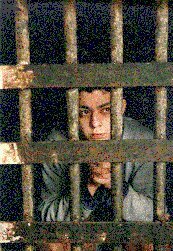
A prisoner in a Rio de Janeiro police lockup |
The past few years have been dramatic ones in Latin American and Caribbean prisons, which hold a total of over half a million inmates.
Conditions continue to stagnate -- and even to worsen in some countries -- inspiring dramatic and violent forms of prisoner protest.
Massacres, riots, and other violent incidents have been occurring in prisons across the region, providing further evidence of the widespread failure of Latin America's penal systems.
Prison unrest erupted over the past two years in Bolivia, Brazil, Colombia, Ecuador, Guatemala, Guyana, Honduras, Jamaica, Mexico, Panama, Peru, and Venezuela. In Brazil, notably, there were some 200 riots in São Paulo prisons and police lockups during 1997. Fifty-two hostages were taken in one such mutiny in August. In Bolivia, thousands of prisoners went on a hunger strike in March 1997 to protest the slow pace of the judicial system and the uneven application of parole law; several of them sewed their mouths shut to dramatize their plight.
As exemplified by the Bolivian protest, prisoners in many Latin American countries are subject not only to horrendous conditions of confinement but to entire criminal justice systems in need of reform. Prisons around the region are filled with procesados: inmates whose cases languish at some stage of the criminal process. Indeed, some 90 percent of Honduran, Paraguayan, and Uruguayan inmates are unsentenced, while in the Dominican Republic, Panama, Haiti, El Salvador, Peru and Venezuela, the proportion of unsentenced inmates ranges from 65 to 85 percent. The slow pace of criminal proceedings, combined with the routine denial of pretrial release, is at the origin of these unhappy statistics.
Human rights ombudspersons from all over Latin America discussed the state of the region's prisons at a February 1997 conference on prison overcrowding that was organized by ILANUD, the U.N. criminal justice institute for Latin America; their reports paint a depressing picture of prisons in crisis. The ombudsperson for El Salvador, for example, spoke of the "systematic violation of the human rights of the prison population" and the unfortunate reality of "cruel, inhuman, and degrading treatment." The Guatemalan representative compared his country's prison conditions against the U.N. Standard Minimum Rules for the Treatment of Prisoners and the Guatemalan Constitution, concluding that neither set of standards was obeyed. With regard to Mexico, the capital's human rights commission confirmed that the majority of the country's prisons "lack basic services," and that inmates "enjoy privileges or suffer wants depending on their economic resources." Other countries' delegates made similar reports.
An encouraging contrast to this generally bleak picture were the vigorous efforts of numerous Latin American countries in working to establish a U.N. mechanism to monitor the treatment of persons deprived of their liberty. Latin American delegates, particularly the representatives of Argentina, Chile, Costa Rica, and Uruguay, were key players in the 1997 and 1998 U.N. debates on the proposed monitoring body, presenting compelling arguments in support of a strong and effective mechanism.